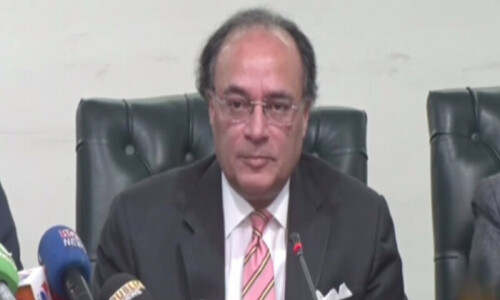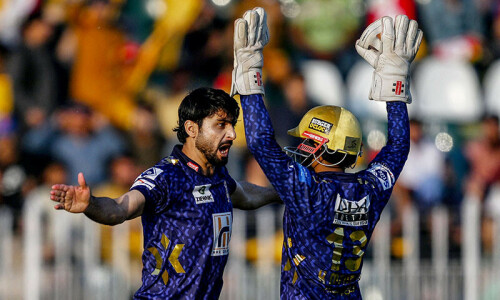
Shoaib Hashmi, with his garrulous excursions that ooze with humour, invariably draws attention of anyone within the audible radius.
Built to the dimensions of an Adonis, Hashmi’s hulk can never be ignored when on the move in any precinct. His exquisite demeanour, in almost any given circumstance, not only leaves a lasting impression but triggers admiration for the wondrous culmination of intellectual traits in a single package.
Anybody who has had the opportunity to have a conversation with him would vouch for his compassion with which he participates.
It is his down-to-earth, warm and simplistic conduct that is the most striking aspect of his persona, but the diverse traits that he manifests through the media are his hallmark.
Although an excellent teacher and mentor, Hashmi is often remembered for his avant-garde humorous productions: Akkar Bakkar, Sach Gup, Taal Matol and Balila for the television before the 1990s and columns he wrote for The News and the Gulf News.
Hashmi’s illustrious academic background boasts a master’s in economics from Government College, Lahore and MSc from the London School of Economics.
For honing his flair for performing arts, he also studied theatre from the Royal Academy of Dramatic Arts, London. Hashmi is recipient of the Tamgha-i-Imtiaz and the coveted President’s Award for Pride of Performance.
Incidentally, being under doctor’s instruction to rest, Hashmi was temporarily inaccessible for this interview.
However, to capture some intimate moments of his rich experiences, his fond student Arshad Mahmud, an accomplished music composer and actor, was approached.
“A man of few words, Hashmi is courteous, tolerant and compassionate. I often meet his friends and students and they all love him,” says Mahmud, “he is basically an artist and a humanist. Poetry and music are his favourite topics of discussion.” He has a strong attachment with literature but no specific political inclination.
Mahmud adds, “If there is oppression he would protest; sometimes in private functions and sometimes openly.” Hashmi’s conversations are overwhelming and everybody savours the remarkable spontaneity, wit and generous sense of humour.
“Hashmi is fond of having his blue-eyed students sit close to him and being one of them, I can infer that the proximity rejuvenates him to exude incredible anecdotes and ideas,” states Mahmud.
Hashmi met Mahmud at Government College, Lahore, in 1969. Mahmud recollects, “Our relationship was that of a teacher and student and during my bachelor’s degree he taught me economics.” Mahmud was beleaguered with Hashmi’s majestic personality, “He would be draped in an impeccably tailored kurta-shalwar, which agreed perfectly with his physique. Holding a cigarette pack in hand, he would radiate the looks of a macho, inundated with graceful confidence,” says Mahmud, “His charismatic personality would cast a lasting impression and to this day, I can visualise every nuance of his immaculate stature vividly.”
During his studies, Mahmud used to dabble in vocals on guitar on the institution’s premises. Little did he know that his fate was about to take an upwards bend! “Hashmi came up to me and said whether I would just continue to make a noise or do something useful?” recollects Mahmud.
Soon after, Hashmi asked Mahmud to compose Rawalpindi say aiey rail. When it went on air in 1972, with a dream fulfilled, an exhilarated Mahmud was a completely changed man, and he attributes his entire career thereafter to Hashmi. How many others went through a similar ecstatic experience is anybody’s guess!
Hashmi hails from a modest but respectable background with intrinsic talent for humour, based around his joyous personality. His elder brother Sohail Hashmi, served the navy while younger brother Humair Hashmi is a psychiatrist.
The brothers, therefore, were distinctly different from one another. Hashmi’s mother used to be extremely friendly, loving and forgiving. Hashmi is a conservative family man and believes in cohesion of the family. He is the type who would find excuses to remain at home.
Travelling is his nemesis and he is also a tad laid-back compared to his wife Salima Hashmi, who is more active. It was during the theatre days that Hashmi met Salima Hashmi, daughter of Faiz Ahmed Faiz, which led to their marriage, followed by two children.
Salima, a painter and art teacher, has served as the principal of National College of Arts and Dean of School of Visual Arts at the Beaconhouse National University.
Hashmi was never too ambitious, but he is passionate and believes that the more the desires, the less the freedom. “He feels that people are imprisoned by their own desires. Although he has faced confrontation, resistance and tribulation but he never showed signs of despair because he believes in remaining happy,” says Mahmud.
Hashmi’s passion is teaching, but with an unconventional approach. During his teaching days, he would include interesting activities to augment his tutorials and take the students for visits to places where they could imbibe their heritage.
Hashmi is as conservative as he is modern and believes in the sanctity of his roots. He has a liking for indigenous foods but unlike a glutton, he always eats with room for hunger.
Amongst traditional cuisine, Hashmi loves the crisp patisa of Amritsar Sweet Shop on Beadon Road, murgh chana of Mc Leod Road, kebabs of Krishan Nagar, Lahore and Bundu Khan’s tikka and sooji ka halwa in Karachi.
When he retired from teaching, Hashmi started writing for newspapers. His writing, usually in burlesque, is based on the prevalent social matters for which he has the knack to say the most serious things in a lighter manner.
He has been a strong proponent of spreading education and gives a tacit but discernible message in his scripts to portray that intelligence and educational qualification are two different things.
Hashmi has written extensively for the theatre and has translated a few books. One of his notable translations is the book titled, A song for this day: 52 poems by Faiz Ahmed Faiz, which has been illustrated by Salima Hashmi. He did quite a few translations of English dramas for the local theatres owing to the paucity of playwrights and drama publications in Urdu.
He was never too critical about the street theatre, their stark travesty and raw lampooning; instead he would prompt to find a solution. “Hashmi would say; let them do what they have to do; criticism and sitting at home won’t help. We must do something,” says Mahmud.
Hashmi has also delivered lectures at the National Academy for Performing Arts (NAPA) in the art of expression and acting.
He is not a moody person at theatre and believes in and preaches perseverance and team work. Hashmi has been a wonderful participant during plays and is like a conductor in an orchestra; above all he is a great director.
When asked whether his legacy is being carried forward, Mahmud’s immediate response is, “We are his legacy. He gives so much to so many and they cherish every word that he says and every move that he makes!”














































